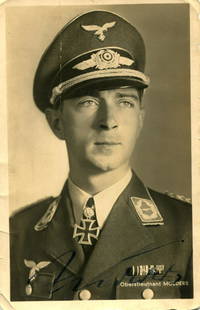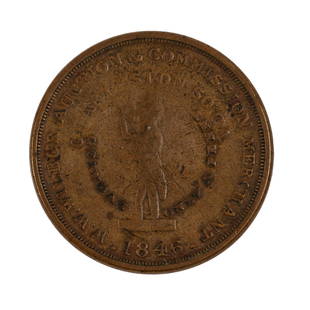
Vilnius register during the First World War - Register for the history of Vilnius in the year of war
Similar Sale History
View More Items in Militaria & War MemorabiliaRelated Militaria & War Memorabilia
More Items in Militaria & War Memorabilia
View MoreRecommended Collectibles
View More




















Item Details
Description
Vilnius register during the First World War - Register for the history of Vilnius in the year of war and occupation, 1922, in Yiddish.
Vilnius register for the history of the city of Vilnius during the First World War. Vilna 1922, 944 pp in two columns, also 472 pp.
Pages 891-944 Yiddishe lider, Material to Yiddishe lider
With many table
Hard embossed leather modern binding with gold lettering to spine, marmoreal endpapers. Size of the book: 35 x 25 cm.
Condition: light brown / brown fragile paper, several tears because of fragile paper; some damping to lower edge of first pages
Weight: 1740 gr.
Published by the Historical Ethnographic Association in Yiddish, edited by Sh. Ansky (Shloyme Zanvl Rappoport)
Edited also by Zalman Raizen, also by Dr. Avraham Wirshovski, Shmuel Leib Zitron and Dr. Zemach Shabad (Jewish medical doctor, he was the prototype of "Doctor Aybolit", a good doctor from a children's poem by Korney Chukovsky in Russian
Shloyme Zanvl Rappoport (1863 – November 8, 1920), known by his pseudonym S. Ansky (or An-sky), was a Jewish author, playwright, researcher of Jewish folklore, polemicist, and cultural and political activist. He is best known for his play The Dybbuk or Between Two Worlds, written in 1914, and for Di Shvue, the anthem of the Jewish socialist Bund.
In 1917, after the Russian Revolution, he was elected to the Russian Constituent Assembly as a Social-Revolutionary deputy
Zemach Shabad (Hebrew: ??? ?????, Polish: Cemach Szabad, Russian: ????? ?????, Tsemakh Shabad; 5 February 1864, Vilnius, Russian Empire (now Vilnius, Lithuania) — 20 January 1935, Vilnius) was a Jewish medical doctor and social and political activist.[1] He was a member of the Senate (parliament) of the Second Polish Republic (1928) and a co-founder and vice-president of the YIVO (Institute for Jewish Research). In 1932, Shabad toured to Palestine with Dr. Abel Lapin from Kaunas. During his trip, Shabad hosted by the Health Committee of the Knesset and the Jerusalem Medical Association.[citation needed]
He was one of the originators of the volkist movement, which eventually turned into the Folkspartei (Jewish People's Party).[2]
In the late 1930s a monument on the outskirts of Vilnius was erected in Shabad's honor;[3] it was destroyed during WWII. In 2007 he was honoured with another monument in Vilnius, reflecting the fact[1] that he was the prototype of "Doctor Aybolit", a good doctor from a children's poem by Korney Chukovsky.
Samuel Leib Zitron (Hebrew: ????????? ?????? ?????????; May 16, 1860 – November 8, 1930), also known as S. L. Citron, was a Hebrew and Yiddish writer, historian, and literary critic. He contributed to the Yiddish press and to nearly all the Hebrew periodicals in the Diaspora over 50 years.[
Zalman Reisen (Yiddish: ?????? ??????; 6 October 1887 – 1940), sometimes spelled Zalman Reyzen, [1] was a lexicographer and literary historian of Yiddish literature.
Early life
Reisen was born in Koydenev (now known as Dzyarzhynsk) in Minsk Governorate (in present-day Belarus) in 1887 to parents interested in the Jewish Enlightenment, or Haskalah. His father wrote poems in Hebrew and Yiddish. His brother, Avrom Reyzen, was a noted Yiddish author and poet. His sister, Sarah Reisen, was also active in Yiddish culture, particularly the Yiddish Writers and Journalists Union of Vilna. He was educated at home, at several different cheders in the area, and attended a Russian state school in Minsk. In 1915, he moved to Vilna, where he would become an active part of the Yiddish intellectual scene as a writer and publisher.
Work
In 1914, Reisen began to work for the Fraind newspaper in Warsaw. From 1916 to 1918 he was an editor for the Letzte Naies in Vilna, and from 1919 he worked for the Wilner Tog. After founder Shmuel Niger[citation needed] left for America, Reisen took over as chief editor and developed the paper into an important forum for discussion of cultural and societal issues of Judaism.
Lexikon
Reisen's most notable achievement was the publication of the Leksikon fun der yidisher literatur, prese, un filologie, (Vilna: 1926–1929). This reference work centralized biographical and bibliographical information on Yiddish writers, providing an invaluable resource to scholars. He gathered information through an ambitious campaign of questionnaires published in newspapers and through word of mouth, in an era of unreliable communication. He continuously refined and improved his work, including more and more writers and improving the accuracy of the information through the years. This work served as the basis for the Leksikon fun der nayer Yidisher literatur, which remains one of the definitive reference works in the field.
YIVO
In February 1925, Reisen organized a conference with Max Weinreich to discuss Nochum Shtif's recent call for a Yiddish institute of higher education. The conference enthusiastically endorsed the idea, and that date is generally accepted as the founding moment of YIVO. Reisen would remain active in the organization, acting as an editor of its scholarly journal, the YIVO-letter, from 1931 to 1939, and mentoring students in its Aspirantur program, which provided advanced graduate training to students of Jewish studies. He traveled to the United States in 1930 and to Argentina in 1932 to raise money and support for the organization.
Fate
Despite being pro-Soviet in inclination, he was arrested by the Soviet occupiers in Autumn of 1939,[1] shortly after the Soviet Union had invaded Poland and Lithuania as a result of the Molotov–Ribbentrop Pact. His fate after this point was unknown, although it was claimed that he was shot by the Soviets in 1941.
Vilnius register for the history of the city of Vilnius during the First World War. Vilna 1922, 944 pp in two columns, also 472 pp.
Pages 891-944 Yiddishe lider, Material to Yiddishe lider
With many table
Hard embossed leather modern binding with gold lettering to spine, marmoreal endpapers. Size of the book: 35 x 25 cm.
Condition: light brown / brown fragile paper, several tears because of fragile paper; some damping to lower edge of first pages
Weight: 1740 gr.
Published by the Historical Ethnographic Association in Yiddish, edited by Sh. Ansky (Shloyme Zanvl Rappoport)
Edited also by Zalman Raizen, also by Dr. Avraham Wirshovski, Shmuel Leib Zitron and Dr. Zemach Shabad (Jewish medical doctor, he was the prototype of "Doctor Aybolit", a good doctor from a children's poem by Korney Chukovsky in Russian
Shloyme Zanvl Rappoport (1863 – November 8, 1920), known by his pseudonym S. Ansky (or An-sky), was a Jewish author, playwright, researcher of Jewish folklore, polemicist, and cultural and political activist. He is best known for his play The Dybbuk or Between Two Worlds, written in 1914, and for Di Shvue, the anthem of the Jewish socialist Bund.
In 1917, after the Russian Revolution, he was elected to the Russian Constituent Assembly as a Social-Revolutionary deputy
Zemach Shabad (Hebrew: ??? ?????, Polish: Cemach Szabad, Russian: ????? ?????, Tsemakh Shabad; 5 February 1864, Vilnius, Russian Empire (now Vilnius, Lithuania) — 20 January 1935, Vilnius) was a Jewish medical doctor and social and political activist.[1] He was a member of the Senate (parliament) of the Second Polish Republic (1928) and a co-founder and vice-president of the YIVO (Institute for Jewish Research). In 1932, Shabad toured to Palestine with Dr. Abel Lapin from Kaunas. During his trip, Shabad hosted by the Health Committee of the Knesset and the Jerusalem Medical Association.[citation needed]
He was one of the originators of the volkist movement, which eventually turned into the Folkspartei (Jewish People's Party).[2]
In the late 1930s a monument on the outskirts of Vilnius was erected in Shabad's honor;[3] it was destroyed during WWII. In 2007 he was honoured with another monument in Vilnius, reflecting the fact[1] that he was the prototype of "Doctor Aybolit", a good doctor from a children's poem by Korney Chukovsky.
Samuel Leib Zitron (Hebrew: ????????? ?????? ?????????; May 16, 1860 – November 8, 1930), also known as S. L. Citron, was a Hebrew and Yiddish writer, historian, and literary critic. He contributed to the Yiddish press and to nearly all the Hebrew periodicals in the Diaspora over 50 years.[
Zalman Reisen (Yiddish: ?????? ??????; 6 October 1887 – 1940), sometimes spelled Zalman Reyzen, [1] was a lexicographer and literary historian of Yiddish literature.
Early life
Reisen was born in Koydenev (now known as Dzyarzhynsk) in Minsk Governorate (in present-day Belarus) in 1887 to parents interested in the Jewish Enlightenment, or Haskalah. His father wrote poems in Hebrew and Yiddish. His brother, Avrom Reyzen, was a noted Yiddish author and poet. His sister, Sarah Reisen, was also active in Yiddish culture, particularly the Yiddish Writers and Journalists Union of Vilna. He was educated at home, at several different cheders in the area, and attended a Russian state school in Minsk. In 1915, he moved to Vilna, where he would become an active part of the Yiddish intellectual scene as a writer and publisher.
Work
In 1914, Reisen began to work for the Fraind newspaper in Warsaw. From 1916 to 1918 he was an editor for the Letzte Naies in Vilna, and from 1919 he worked for the Wilner Tog. After founder Shmuel Niger[citation needed] left for America, Reisen took over as chief editor and developed the paper into an important forum for discussion of cultural and societal issues of Judaism.
Lexikon
Reisen's most notable achievement was the publication of the Leksikon fun der yidisher literatur, prese, un filologie, (Vilna: 1926–1929). This reference work centralized biographical and bibliographical information on Yiddish writers, providing an invaluable resource to scholars. He gathered information through an ambitious campaign of questionnaires published in newspapers and through word of mouth, in an era of unreliable communication. He continuously refined and improved his work, including more and more writers and improving the accuracy of the information through the years. This work served as the basis for the Leksikon fun der nayer Yidisher literatur, which remains one of the definitive reference works in the field.
YIVO
In February 1925, Reisen organized a conference with Max Weinreich to discuss Nochum Shtif's recent call for a Yiddish institute of higher education. The conference enthusiastically endorsed the idea, and that date is generally accepted as the founding moment of YIVO. Reisen would remain active in the organization, acting as an editor of its scholarly journal, the YIVO-letter, from 1931 to 1939, and mentoring students in its Aspirantur program, which provided advanced graduate training to students of Jewish studies. He traveled to the United States in 1930 and to Argentina in 1932 to raise money and support for the organization.
Fate
Despite being pro-Soviet in inclination, he was arrested by the Soviet occupiers in Autumn of 1939,[1] shortly after the Soviet Union had invaded Poland and Lithuania as a result of the Molotov–Ribbentrop Pact. His fate after this point was unknown, although it was claimed that he was shot by the Soviets in 1941.
Buyer's Premium
- 25%
Vilnius register during the First World War - Register for the history of Vilnius in the year of war
Estimate $200 - $300
2 bidders are watching this item.
Shipping & Pickup Options
Item located in Gedera, Hashfela, ilOffers In-House Shipping
Local Pickup Available
Payment

Related Searches
TOP



















































![[CIVIL WAR] CSA General Isaac Trimble’s Book, WIA & POW Gettysburg, Pickett’s Charge: Alexis de Tocqueville. Henry Reeve, translator. Democracy in America. New York: George Adlard, 1838. 8vo, publisher’s brown-green cloth. Second American Edition. Inscription as prisoner-of-war t](https://p1.liveauctioneers.com/7226/325455/175169054_1_x.jpg?height=310&quality=70&version=1712370394)







![George Washington Signed Discharge: Partly printed discharge document signed by George Washington, as Commander in Chief of the Armies of the United States. Newburgh, [New York], 4 January 1783. 1 page, ## x ## in. Undersigned by Washin](https://p1.liveauctioneers.com/7226/322253/173251475_1_x.jpg?height=310&quality=70&version=1710004847)
![[Ambrotype] Texas Confederate Soldier: Sixth plate ambrotype. Full leatherette case. Portrait of a possible Texas Confederate soldier. A silver star device was used to pin up the brim of his light-toned headgear, a look often seen in image](https://p1.liveauctioneers.com/7226/322253/173251509_1_x.jpg?height=310&quality=70&version=1710004847)
![Captured Bowie Knife w/ Period Note of Provenance: Captured Confederate D-hilt Bowie knife. [Kenansville, North Carolina]: [Louis Froelich factory]. With original metal and leather sheath with affixed period notes. First note with only remnants. Secon](https://p1.liveauctioneers.com/7226/325455/175169154_1_x.jpg?height=310&quality=70&version=1712370394)
![[Civil War] Bullet Which Nearly Killed Soldier: Lead bullet encased in gold acorn fob with chain. Finely engraved: "W.D. Fiske / 14th Regt. C V / Fredericksburg / Dec 17, 1863." Acorn approx. 1 1/2 x 1 in. Overall length 6 1/2 in. Published in "Her](https://p1.liveauctioneers.com/7226/325455/175169103_1_x.jpg?height=310&quality=70&version=1712370394)

![[CIVIL WAR] 1st Texas Infantry in Camp: Outdoor half plate ambrotype of the 1st Texas Infantry. Full leatherette case. Significant, large half plate ambrotype of members of the 1st Texas Infantry at ‘Splinterville,’ the regiment’s win](https://p1.liveauctioneers.com/7226/322253/173251512_1_x.jpg?height=310&quality=70&version=1710004847)

![[HANCOCK, John] Washington’s Spy, Officer’s Commission: Partly printed document signed by John Hancock as President of the Continental Congress, for Epaphras Bull (1748-1781). [Philadelphia, Pennsylvania], 10 January 1777. 1 page, ## x ## in. Completed in](https://p1.liveauctioneers.com/7226/322253/173251471_1_x.jpg?height=310&quality=70&version=1710004847)
![[CIVIL WAR] Black Soldier & Wife: CDV-sized tintype photograph WITH gem-sized tintype. Full thermoplastic case. Portrait of an unknown African American Civil War soldier who holds the rank of sergeant. He looks directly at the camera](https://p1.liveauctioneers.com/7226/322253/173251671_1_x.jpg?height=310&quality=70&version=1710004847)
![Historic Einstein Signed Program from Lincoln University Visit: Conferences on Objectives. Lincoln University, [Oxford], Pennsylvania, 3 May 1946. SIGNED BY ALBERT EINSTEIN. Tipped into Horace Mann Bond (1904-1972). The Education of the Negro in the American Socia](https://p1.liveauctioneers.com/7226/322253/173251693_1_x.jpg?height=310&quality=70&version=1710004847)
![[Civil War] Cavalry Regiment's Colors : Regulation Civil War Cavalry Regimental flag, c. 1861-1865. Hand-painted and gilded on silk. Approx. 34 x 31 inches. Trimmed on three sides with gold silk fringe. Extremely fine Federal regulation han](https://p1.liveauctioneers.com/7226/325455/175169108_1_x.jpg?height=310&quality=70&version=1712370394)







